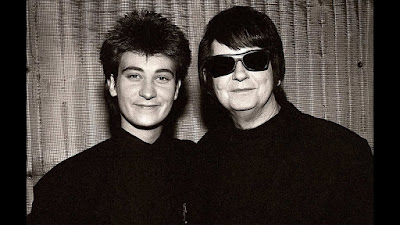Wait for It
Among the reasons I continue with this blog, rather than simply sharing thoughts and links on social media, is that I have often musical musings that require a little more explication and illustration. Case in point: I noticed recently, again, how much I love the last verse and chorus of the Sundays' "Here's the Where Story Ends," when Harriet Wheeler pushes the last note of each line up a third from its previous placement. Here's the way the verse goes the first two times around:
And the chorus the first few times is simply:

Third time around, though, is the charm, as she sings (at about 1:50 above):

That beautifully spells out the major-seventh-ness of those chords, and then on the chorus, the leap up a third makes a bruising, smudgy ninth sound:

And the last time 'round, there's a little grace-note cherry on top:

The effect of this inspired variation, I find, is that it haunts the earlier iterations like a harmonic overtone—I can hear it before it arrives, and if I sing along I find it hard not to slip my way up that delicious third. Which got me thinking about one of the greatest examples of this kind of upward leap in pop, the ultimate topper, which as in this case makes the earlier iterations seem like mere warmups: "Time After Time."
Tell me, when you hear this line:
Don't you anticipate, don't you somehow feel like a musical phantom limb, the way this line breaks loose in its final iteration:

I know there are other examples like this—Paul Simon often embellishes his melodies in later choruses, as do countless melismatic divas. But I'm having trouble thinking of other examples as memorable as these. Yes, every time I hear the chorus of Elvis Costello's "Pump It Up," I'm anticipating the final repeated shout of "Don't really need it" that only arrives in the last 30 seconds of the song; the octave leaps in "Crying" and "God Give Me Strength" create an undeniable musical suspense; the extended finale of Rufus Wainwright's "Poses" always seems to be lurking like potential energy within its slow-simmering ostinato; the final "so long to find out" on "Day Tripper" has a similar faint tug.
I am sure I must be missing some choice cuts. Can you think of any such inspired variations, dear reader?

And the chorus the first few times is simply:

Third time around, though, is the charm, as she sings (at about 1:50 above):

That beautifully spells out the major-seventh-ness of those chords, and then on the chorus, the leap up a third makes a bruising, smudgy ninth sound:

And the last time 'round, there's a little grace-note cherry on top:

The effect of this inspired variation, I find, is that it haunts the earlier iterations like a harmonic overtone—I can hear it before it arrives, and if I sing along I find it hard not to slip my way up that delicious third. Which got me thinking about one of the greatest examples of this kind of upward leap in pop, the ultimate topper, which as in this case makes the earlier iterations seem like mere warmups: "Time After Time."
Tell me, when you hear this line:
Don't you anticipate, don't you somehow feel like a musical phantom limb, the way this line breaks loose in its final iteration:

I know there are other examples like this—Paul Simon often embellishes his melodies in later choruses, as do countless melismatic divas. But I'm having trouble thinking of other examples as memorable as these. Yes, every time I hear the chorus of Elvis Costello's "Pump It Up," I'm anticipating the final repeated shout of "Don't really need it" that only arrives in the last 30 seconds of the song; the octave leaps in "Crying" and "God Give Me Strength" create an undeniable musical suspense; the extended finale of Rufus Wainwright's "Poses" always seems to be lurking like potential energy within its slow-simmering ostinato; the final "so long to find out" on "Day Tripper" has a similar faint tug.
I am sure I must be missing some choice cuts. Can you think of any such inspired variations, dear reader?




With the Cyndi Lauper example, it's not just that the melody goes to higher notes, it's that the rhythm changes to something that's more natural and singable, right? The first choruses are accented like "I'll BE wait-ING," which is frankly awkward. Changing the lyrics/rhythm so that it's "*I* will be WAIT-ing" is much better from a text setting perspective!
ReplyDeleteYes, I noticed that too! I think that must also why it sticks.
ReplyDeleteThis comment has been removed by the author.
ReplyDelete